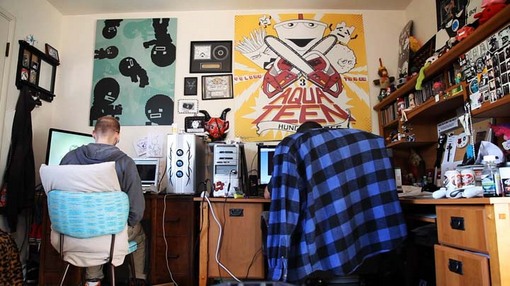“Indie Game: The Movie” (103 minutes) is available on iTunes on Demand, VHX Direct Download, Steam and directly from the filmmakers.
A debate that occasionally rages over at Roger Ebert’s Journal deals with whether video games can be considered art. Mr. Ebert does not believe so, and his belief has inspired numerous gamers to respond with fury. Some suggest titles that allegedly illustrate the artistic side of online games. Others suggest that a certain film critic is a crabby old man who need not concern himself with a more youthful pastime. Truthfully, I don’t give a crap about the “video games as art” argument; it’s an arts major argument and we science majors aren’t in the business of artful designation.

But the debate popped briefly into my head while watching “Indie Game: The Movie.” This smart, incisive documentary by Lisanne Pajot and James Swirsky follows four men who create online games they feel are extensions of themselves. One speaks of taking all his vulnerabilities and flaws and putting them into his games. Writers do that with novels, painters do it with an easel, and a lot of times, the result is considered art. “Indie Game” shows the creative process in making a game, including graphical design and the crafting of game plot and character. It’s like painting a picture and writing a short story, both valid art forms. This is certain to fuel the fires under this debate.

“Indie Game: The Movie” doesn’t provide any commentary on the art vs. not-art discussion. Instead, it makes palatable to the layman the subject of programmers and the code they write to survive. This is a commendable feat. I have been a programmer for two and a half decades, and even I’ll admit that what we do is not only unfilmable but of no interest whatsoever to the non-technical. It takes a special kind of insanity to write code, plus a personality not unlike Sheldon on “The Big Bang Theory.” I think I’m more like “Big Bang’s” Leonard, but I admit that I am crazy enough to code for a living.

The four coders profiled have forgone working for large game makers like EA and Activision to focus on the independent game market. Not unlike the indie film market, independent games are made by one or more self-employed coders and designers. The upside to this methodology is creative freedom; the downside is the lack of a safety net in case the project fails. According to the documentary, as soon as this concept was proven viable by games like Jonathan Blow’s “Braid” and the company Valve, companies like Microsoft got involved in order to compete. Social media and a large online gaming community drive the market, so buzz and anticipation (or the lack thereof) can make or break a game.

Though this is a documentary about programmers, it wrings maximum suspense and a genuine emotional response from their plight. The subjects trust Pajot and Swirsky, offering them full access to their work, triumphs, failures and aggravations. Each coder has a unique personality and proves to be a wise choice for the film: One is a successful independent game designer, and the other three have games in some form of production. “Indie Game” follows these three through the process of design, demonstration and delivery. One demo in particular is an extremely tense exercise in terror for any programmer.

Blow serves as the film’s voice of experience, having written games for more years than any of the others. He provides the quote about putting his vulnerabilities into the game, and is mentioned at least once by the other developers as a success story from which they can model their own. Blow’s game, “Braid,” was well-received but he voices concern about the reasons. Blow tells the camera he feels that the audiences didn’t zero in on what he felt was most important about the game. “Indie Game” points out that Blow has a reputation on the Internet for responding to every mention of his name in an article, which earned some mocking from commenters and outlets. Because I’ve no tolerance for people whining about their success, I was about to yell “quit bitching and take the money!” at the screen. Then I saw video of a rapper discussing “Braid” in the most simplistic, almost ignorant fashion. “Maybe Blow’s on to something here,” I thought.


Edmund McMillen and Tommy Refenes are developers whose game is being released at the beginning of the film. Or so we think. It’s missing from the XBLA (Xbox Live Arcade) lineup, and Refenes is freaking out. The film circles back to this scene later, so we can see the outcome. Until then, “Indie Game” depicts the duo in the late stages of their game “Super Meat Boy.” It’s a love story about a skinless boy who must be reunited with his girlfriend. She’s made entirely out of bandages, giving new meaning to that old jingle “I am stuck on Band-Aid, and Band-Aid’s stuck on me.” Along the way, Super Meat Boy must dodge buzzsaws and anything else that can rend his meaty body asunder. McMillen describes how video game elements and levels should work, citing not only his game but Super Mario Bros. as well. Despite my writing about several E3’s for a now-defunct online video game magazine, I never made the connection McMilllan makes.


Phil Fish provides much of the film’s suspense. The developer of “Fez,” a game about a 2D entity in a 3D world, received maximum buzz in 2008 after showing some of the game to the community. He even won an award for it. However, development delays have cost him much goodwill and buzz in the gamer community. Add to that legal problems, design issues, an acrimonious split between Fish and his first partner, and a loss of Canadian funding, and you have the makings of high drama. Fish admits that he and his designer, Renaud Bedard, have bitten off more than they can chew, but he has one more chance to regain the interest “Fez” once had: A demo of the unfinished game at Boston’s PAX Expo in 2011. Ignoring that he might get sued for doing so, Fish builds his PAX kiosk and plugs in a console for the game. Several players show up to test drive the game, but every single one of them experiences major problems with the game. Fish blames an unstable code base built after numerous changes the night before, and the programmer in me once again engaged the screen: “You NEVER make big changes before a demo!!” As Fish constantly rebooted the machine in frustration, I relived every demo I’ve ever had that blew up. (Every demo blows up at least once–trust me on this.)

Though programmers tend to be hermetic, “Indie Game: The Movie” at least shows its subjects interacting with others. We spend some time with McMillen and Wife, and with Refenes’ parents. All four developers speak directly to the camera, providing information, blowing off steam and venting their frustrations. By the credits, I felt as if I had gotten closer to them than I’ve been to most of the programmers I’ve worked with for years.

Pajot and Swirsky deliver a slick, polished, and fast-paced piece of work, one that they are distributing themselves. “Indie Game: The Movie” is edited with care, with the duo selecting footage that is both compelling and informative. It not only made me want to play the games I saw, it made me long for the days when I had a lot more time to press buttons on game controllers. Unless I hit the lottery, those days shall remain long gone.

But since I had not played the games depicted in “Indie Game: The Movie,” I sought the opinion of a gamer: my best friend, Chris. Chris loved the gameplay on “Super Meat Boy” and found it as difficult as McMillen and Refenes had hoped. He’d also enjoyed “Braid,” but when I mentioned “Fez,” he drew a blank until he looked it up. “Oh, I saw a demo of this years ago,” he said. “I had completely forgotten about it.” Something tells me Phil Fish better hurry up and finish that game.
[Postscript: “Fez” was finally released in April, 2012.]













